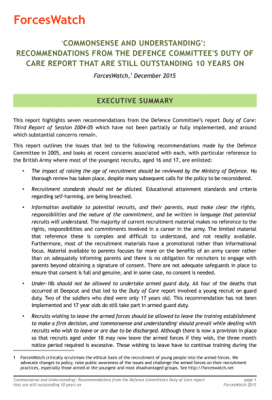risks
‘Commonsense and Understanding’: Recommendations from the Defence Committee’s Duty of Care report that are still outstanding 10 years on
December 2015

This report highlights seven recommendations from the Defence Committee’s report Duty of Care: Third Report of Session 2004-05 which have not been partially or fully implemented, and around which substantial concerns remain.
This report then discusses the concept of 'in loco parentis' and 'moral obligation' with regard to the army's duty of care towards young recruits, noting that the Defence Committee were concerned in 2005 that the MoD distinguished too rigidly between legal and moral obligations, with the latter as less important.
In 2005, the Defence Committee discussed the lack of balance beween training needs and considerations for operational effectiveness, and thus made its recommendations. Ten years on, it is apparent that operational arguments, and current difficulties meeting recruiting targets, continue to prevent the armed forces from reviewing both their position on enlisting under-18s, and their recruitment practices and materials.
Army urged to stop using armed teenagers to guard barracks
16/12/2015The Guardian
The Guardian
ForcesWatch report calls on UK military to stop recruiting minors altogether, as armed forces bill due for third reading
New report shows that important duty of care recommendations have not been implemented by the armed forces
16/12/2015ForcesWatch press release
ForcesWatch press release
Ahead of the House of Commons debate on the Armed Forces Bill on Wednesday 16 December, ForcesWatch has published a new report calling for a change in the law ending military recruitment under 18 years of age.
ForcesWatch welcomes Welsh Government stance over military visits to schools
23/09/2015ForcesWatch press release
ForcesWatch press release
The Welsh Government has been praised by ForcesWatch over a “groundbreaking” decision to support in principle more research into how the armed forces operate in secondary schools in Wales.
Armed forces not required to offer soldiers aged 16-17 the same standard of education that is required in civilian life
30/06/2015Child Soldiers International
Child Soldiers International
Compulsory education for 16-17s: research reveals that the armed forces are not required to give child soldiers the same minimum standard as civilian institutions. The minimum attainment requirement of the Army (which has the vast majority of children in the armed forces) is shown to be very low.
British Veterans Made Some Dark Films to Protest the UK Army’s Recruitment of 16-Year-Olds
30/06/2015Vice

Vice
An article on the context of the striking new short film from Veterans for Peace UK, Action Man: Battlefield Casualties , which presents a new range of war-traumatised action men.
How did Britain let 250,000 underage soldiers fight in WW1?
2014

A BBC resource. Includes a final section on 'could this happen today'? At the outbreak of war in 1914, the British Army had 700,000 available men. Germany’s wartime army was over 3.7 million. When a campaign for volunteers was launched, thousands answered the call to fight. Among them were 250,000 boys and young men under the age of 19, the legal limit for armed service overseas.
Drone Wars: Pilots reveal debilitating stress beyond virtual battlefield
13/05/2014livescience.com
livescience.com
"To extinguish a person's life is a very personal thing. While physically we don't experience the five senses when we engage a target — unlike [how] an infantryman might — in my experience, the emotional impact on the operator is equal."
ForcesWatch submission to Defence Select Committee inquiry on Military Casualties
March 2014
ForcesWatch's submission to the Defence Select Committee inquiry on Military Casualties draws on our research published in The Last Ambush.
Militarisation in everyday life in the UK: a conference report

In response to the recent developments in the UK, there has been an increase in critical academic studies, media coverage, and work by campaigning organisations and others on these issues. On 19 October 2013, around 70 academics, activists, campaigners, and writers came together in London at the Militarisation in Everyday Life in the UK conference organised by ForcesWatch.
